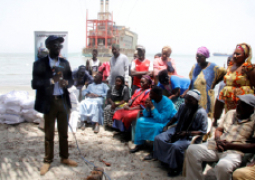
This came through the assessment conducted on the issue of statelessness in Ghana Town by the Commission and UNHRC targeting individuals aged 18 and above.
According to the assessment report presented by Omar T. Camara, the government focal person, the Ghana Town was established in the early 60s by Ghanaian migrants who have settled for over five decades with children born in the country without Gambian or Ghanaian documents thus making them outlawed.
He suggested for the government to simplify the naturalization process for Ghana Town community, if direct citizenship is challenging.
Camara explained that in 2014, former president Jammeh issued a directive allowing residents to receive Gambian ID cards, however, it’s claimed that the measure lacked legal backing which is why most of them could not renew their documents.
“If you are born here by non-Gambian parents, you are considered as a non-citizen of the country,” he stated.
However, the assessment indicates that most of the respondents do not possess a valid or expired document due to the nationalities of their parents indicating significant risks of statelessness since they cannot prove whether they are citizens of either country.
The assessment on recognition highlights the urgent need for action to protect individuals’ rights and ensure access to legal recognition. Since there are changes to legal documentation and policies, the residents of Ghana Town risk being considered settlers in The Gambia.
Camara outlined that it is crucial for the government to implement policies that address the citizenship concerns of the Ghanaian community.
“We are advocating for the government to simplify the naturalization process for Ghana Town community, if direct citizenship is challenging. We can propose administrative adjustments to make naturalization more accessible for those who consider the country as their home.”
The assessment outlined that out of 686, only 53 had a Gambian passport with 634 born in the country and 47 in Senegal. If the document expired, GID would not renew it because they are from Ghana Town as the issues around them are not declared.
Additionally, low percentages of correspondents with valid passports, 6.3% are illegal.
Read Other Articles In Headlines
U.S. efforts Support first Solar Green Mini Plant in Gambia
Mar 10, 2022, 12:05 PM



